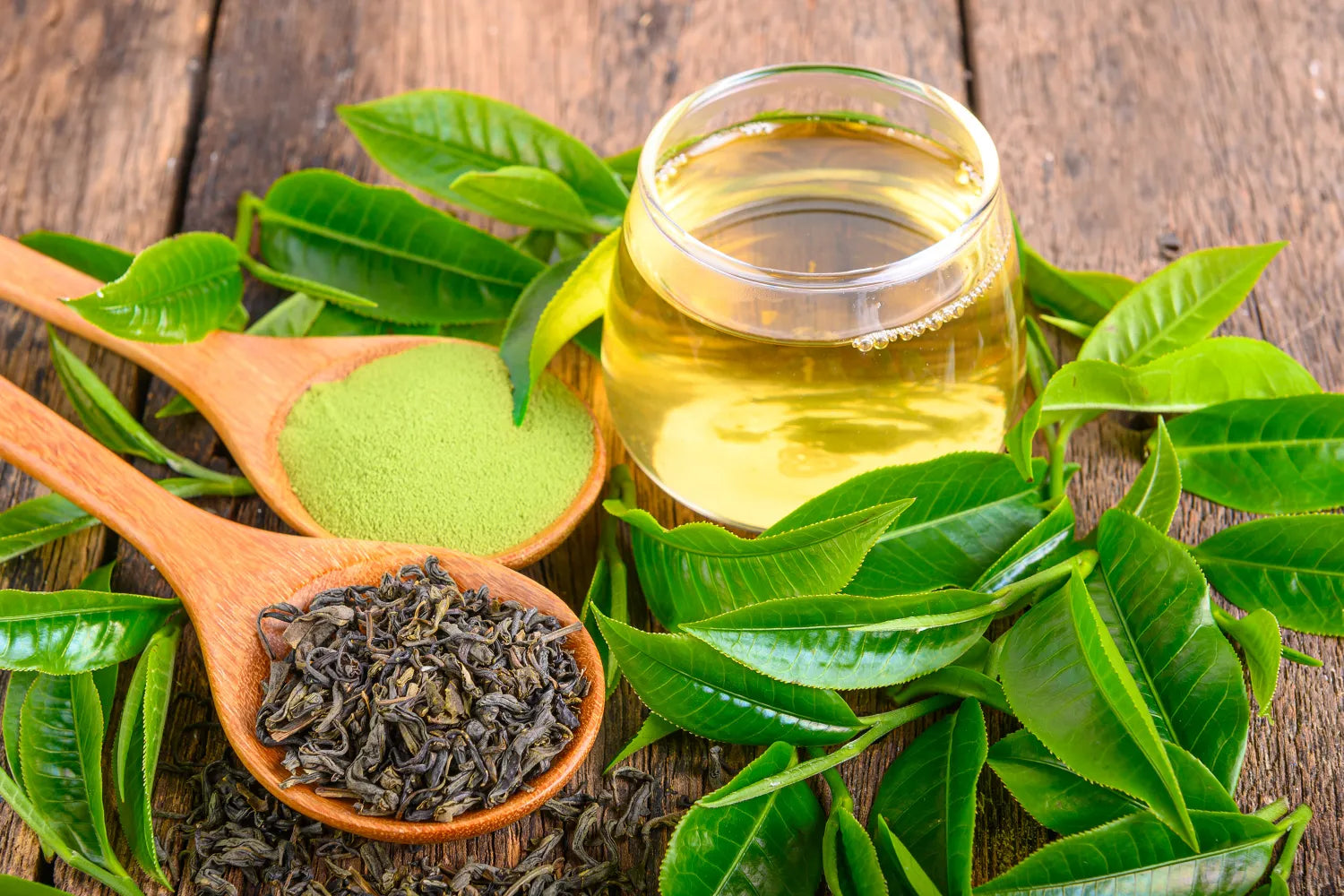How Much L-Theanine Is in Green Tea?

When you walk down the supplement aisle, you might notice a common theme: Most dietary supplements can be found in nature. Think about it — vitamin C comes in a capsule, but it is also in citrus fruits and sweet peppers. Magnesium comes in a tablet, but it is also in chocolate and spinach.
L-theanine is a popular supplement that people use to support feelings of relaxation and brain health. However, this ingredient wasn’t cooked up in a lab — it actually comes from tea leaves.
While L-theanine supplements are usually more concentrated, you can experience some benefits of L-theanine by simply drinking green tea. Read on to learn more about L-theanine and how much is in green tea.
What Are the Benefits of L-Theanine?
L-theanine is a unique amino acid that comes from the tea plant (Camellia sinensis). The leaves of this plant are used to make various tea types, from black tea to white tea and green to oolong. The main difference between these types of teas is how the leaves are dried and processed.
L-theanine is popular for its health benefits. There are also very few side effects of L-theanine, which makes it a widely recommended choice for those looking for relaxation.
That said, before we dive into the benefits of L-theanine, it’s important to contact your healthcare provider before you start taking any new supplement. This is especially true if you’re pregnant or breastfeeding.
Now, let’s discuss some of the most popular benefits of L-theanine. These include the following:
- Encourages Feelings of Relaxation: L-theanine can support a healthy stress response by encouraging normal levels of cortisol.
- Supports Neurotransmitters: L-theanine can help balance levels of glutamate and gamma-aminobutyric acid (GABA), which can further encourage a relaxing effect.
- Supports Mental Health: L-theanine can support healthy levels of serotonin and dopamine, which can encourage a relaxed and happy mood.
- Encourages Focus and Memory: L-theanine can support cognitive function, including focus, memory, and performance on attention tasks.
- Supports Long-Term Brain Health: This amino acid can also support long-term brain function in healthy adults.
- Encourages a Good Night’s Sleep: L-theanine can encourage alpha brain waves, which can support sleep quality.
- Mitigates the Effects of Caffeine: Lastly, the combination of L-theanine and caffeine can help minimize the negative side effects of caffeine.
How Much L-Theanine Is in Green Tea?
Green tea is just one variety of tea that comes from the tea plant. That said, green tea tends to have the highest L-theanine content and the lowest caffeine content out of all of the different types of tea.
While the exact amount of L-theanine in your cup of green tea is bound to change depending on where your tea was sourced, how it was grown, and how it was processed, the average cup of green tea typically contains around 6.56 mg/g of L-theanine.
Green tea is also popular for its catechins, which have exceptionally powerful antioxidant activity. These catechins can complement the effects of L-theanine by supporting brain and cardiovascular health.
What About Matcha?
Matcha is a type of green tea that is exceptionally high in caffeine and L-theanine. Many of these differences are due to the way matcha plants are grown. While matcha plants are technically the same as tea plants, matcha plants are grown in the dark to encourage a higher L-theanine content.
Matcha is also consumed differently than green tea. Instead of soaking tea leaves in water to create an infusion, matcha leaves are ground into a powder that is mixed with hot water. When you drink matcha, you’re actually ingesting the green tea leaves.
The actual L-theanine content of matcha varies depending on where you buy it from, how it was grown and processed, and whether you’re using ceremonial or culinary matcha. Matcha production is much more nuanced, but matcha generally contains up to 45 mg/g of L-theanine.
Introducing Everyday Dose Mushroom Matcha+
Matcha is a great natural source of L-theanine — in fact, Camellia sinensis is the only dietary source of L-theanine. However, you can also supplement your L-theanine intake to help support benefits like feelings of relaxation, cognitive performance, sleep quality, and mental health.
If you’re looking for an L-theanine supplement, give our Mushroom Matcha+ blend a try. This powder is made of high-quality, ceremonial-grade matcha that boasts a rich umami flavor and bright green color.
Along with the L-theanine naturally present in matcha, we also add 120 mg of L-theanine per serving. Our mushroom matcha also features 39 mg of caffeine per serving, which is enough to help you feel energized without falling victim to the caffeine jitters.
Our blend also includes lion’s mane mushroom to support focus, collagen to encourage gut health, and chaga mushroom to support the immune system. As if that wasn’t enough, our matcha is incredibly easy to make. Simply combine the powder with hot water and whisk — no extra brewing time is needed!
Wrapping Things Up
L-theanine is a popular ingredient in many brain supplements, but did you know that it can also be found in green tea? Supplements are generally much more concentrated, but you can still get up to a whopping 45 mg of L-theanine in matcha.
Luckily, you can easily combine the two. Our Mushroom Matcha contains an extra 120 mg of L-theanine per serving, which makes it a delicious and easy way to try the combo for yourself. To learn more about matcha and its benefits, visit the Everyday Dose blog today!
Sources:
Theanine and Caffeine Content of Infusions Prepared from Commercial Tea Samples | Pubmed.gov
Health Benefits and Chemical Composition of Matcha Green Tea: A Review | Pubmed.gov
L-Theanine reduces psychological and physiological stress responses | Pubmed.gov
L-theanine, a natural constituent in tea, and its effect on mental state | Pubmed.gov
L-theanine partially counteracts caffeine-induced sleep disturbances in rats | Pubmed.gov
Start your day
The Right Way









